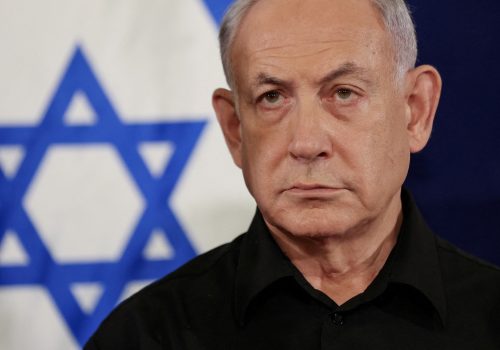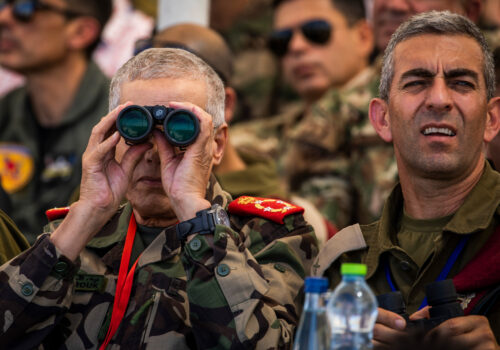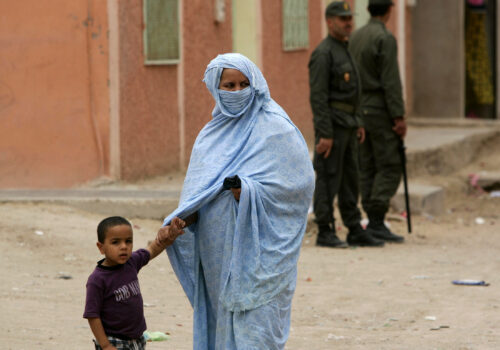A blueprint for a trilateral Morocco-Israel-US investment fund
The Abraham Accords, the landmark agreement to establish official relations between Israel and a number of its Arab neighbors in 2020, opened a historic window for peace in the Middle East and North Africa. But windows don’t stay open forever. While normalization between Morocco and Israel has progressed on the diplomatic and commercial levels, it still lacks a long-term structural anchor. Without a clear mechanism to turn this momentum into measurable strategic outcomes, the risk of losing traction is real, and the alliance could remain largely symbolic, without delivering concrete regional impact or hitting the ceiling of what is possible.
With growing instability in North Africa and the Sahel, and intensified geopolitical competition in the Mediterranean, the United States, Morocco, and Israel have an opportunity to spearhead a forward-looking joint investment fund and coordination forum that would transform diplomacy into durable infrastructure that delivers on tangible results.
Jointly governed by Morocco, Israel, and the United States, this fund would both directly and jointly coordinate finance strategic projects in energy, digital infrastructure, advanced industrial, and regional security. An instrument like this would be a perfect marriage between US financial and political convening power, Morocco’s industrial platforms, and Israel’s innovation ecosystem to collectively enhance competitiveness, create jobs, and secure regional supply chains. For a Washington calling on partners to stand up, establishing a fund would help empower the three countries to support long-term regional stability and collective prosperity that both showcases and deepens the benefits derived from the Abraham Accords.
The problem and the solution for an alliance without strategic leverage
Since the signing of the Abraham Accords in 2020, the normalization of relations between Morocco and Israel has opened a new era of cooperation. Politically and economically, signs of rapprochement are evident: increasing bilateral visits, sectoral agreements, business initiatives, and emerging technological partnerships. Yet this momentum remains fragile, fragmented, and incomplete.
Without a shared mechanism, cooperation between Morocco and Israel remains vulnerable to political fluctuations, lacks visibility for long-term investors, and fails to reach the scale needed to reshape regional dynamics. While isolated successes exist—such as joint innovation programs or sectoral agreements—they remain disconnected and difficult to replicate. A structured platform would allow the three parties to consolidate trust, pool resources, and define common priorities across security, energy, industry, and technology. This is a major missed opportunity to move beyond ad-hoc engagements at a time of rapid transformation across the geopolitical and geoeconomic landscape, while strategic challenges are proliferating, particularly from instability in the Sahel, increased geopolitical competition in the Mediterranean, and rising migration pressure toward Europe.
SIGN UP FOR THIS WEEK IN THE MIDEAST NEWSLETTER
A convening forum and trilateral investment fund, jointly governed by Morocco, Israel, and the United States, would be an effective tool to give the strategic alliance deeper geopolitical weight. This central body would be tasked with coordinating disparate lines of effort across each country’s respective public and private sectors and providing direct financing for high-impact strategic projects in key divisions, including energy, critical infrastructure, industrial transformation, security technologies, defense industry, maritime industry, and logistics innovation.
The forum would be designed not as a development aid mechanism but rather as a sovereign investment tool that could generate measurable returns. Its operational model would be based on shared governance between the three states, including having representatives from the private sector and diaspora communities, and a rigorous, transparent selection of projects based on economic viability, strategic relevance, as well as clear investment return for the forum’s backers.
What the United States gains through a trilateral fund
As global power dynamics continue to shift, the United States must go beyond supporting traditional bilateral alliances and reimagine its most important growing strategic partnerships, as with Israel and Morocco. Intentionally curated regional platforms are capable of producing tangible and lasting outcomes that would also reliably return real value from investments. Therefore, the proposed trilateral investment forum would constitute an important innovation in both regional Mediterranean policy for the United States and offer important lessons for new mechanisms for US engagement that combine traditional diplomacy, economic strategy, and direct returns on mutual interests.
The model would ensure that the United States improves its long-term standing through a durable, coherent, transparent, and scalable architecture. This fund is especially timely and relevant for three primary reasons.
First, the fund would serve as a counterweight to the growing influence of rival powers—namely, China, Russia, and Iran. All three players are advancing their agendas across North Africa, the Sahel, and the Mediterranean through major investments in infrastructure, energy, ports, and security. If designed with proper financial resources, this proposed trilateral forum would provide a credible alternative for financing and competitive projects that would promote US interests and support local innovation ecosystems.
Second, the fund would deliver value that would help publicize the “normalization dividend” that was expected from the Abraham Accords. Five years after their signing, few concrete mechanisms have emerged to convert diplomatic momentum into long-term economic prosperity, largely due to the absence of a standard operational vehicle to coordinate and scale projects. Since the Accords were signed, most engagement has remained bilateral and unstructured, often driven by individual ministries, private actors, or external partners without a shared vision or platform. Moreover, in the absence of a dedicated fund or permanent forum, many successful initiatives—particularly in business, innovation, and security—remain under the radar and disconnected from broader strategic messaging. A trilateral forum could lay a model that could support the overall expansion of the Abraham Accords, demonstrating Washington’s ability to support strategic and enduring projects with key regional partners, advancing regional security and prosperity.
And third, the fund would give the United States a results-driven tool of influence and a mechanism to return value to the American taxpayer. Unlike one-off aid programs or broad diplomatic commitments, this fund could generate measurable benefits, including local job creation, inclusion of American companies in regional initiatives through the requirement for US primes, growth in trilateral trade, and supply chain security, all while integrating American partners into the overall ecosystem of the Abraham Accords.
Roadmap and success indicators
The implementation of the trilateral investment fund should follow a three-pronged and phased implementation strategy, with the ultimate goal of achieving a well-structured governance architecture and a clear remit for the new body:
- The initial phase focused on political agreement and framework design, including trilateral deliberations on the working level across all three parties.
- The secondary phase focused on deploying high-impact pilot projects in priority sectors, potentially through the Development Finance Corporation or other appropriate funding mechanisms.
- The final long-term structuring phase aimed at scaling the mechanism and embedding it within an enduring institutional architecture, such as a jointly governed trilateral fund.
To ensure credibility and effectiveness, the fund must deliver measurable outcomes based on clear criteria, including economic impact (mobilized investment, job creation, industrial upgrading), tangible strategic alignment (political engagement, intergovernmental coordination, diplomatic returns), and proven replicability (ability to adapt the model to other regional cooperation frameworks).
A new trilateral forum that delivers on the promise of the Abraham Accords is a unique opportunity to support American engagement in an area of critical geopolitical importance. By aligning capital, innovation, and market access, this forum would not only reinforce the foundations of the Abraham Accords but also project a stabilizing influence across the Afro-Mediterranean space at a time of intense competition and uncertainty. It would offer the United States a modern, agile, and measurable tool of engagement that would competitively address the core sovereignty, security, and economic concerns its partners face in the Global South.
Aïssa Christophe Agostini is a strategic economic advisor and founder of Prosper Atlas, a consulting firm focused on trilateral partnerships between the United States, Israel, and Morocco.
Further reading
Mon, Apr 28, 2025
Why Israel will resist any US-Iran nuclear deal
MENASource By Danny Citrinowicz
Negotiations between the United States and Iran have displayed a significant divide between Washington and it’s ally Israel.
Tue, Jan 21, 2025
How the Gaza war brought Morocco and Israel closer
MENASource By Sarah Zaaimi
Security cooperation between Israel and Morocco is flourishing and has never been stronger, driven by a common Iranian threat and a shared vision for regional integration.
Wed, Apr 9, 2025
Why it’s time to terminate the UN’s dysfunctional mission in Western Sahara
MENASource By Sarah Zaaimi
Only way out of fifty-year colonial impasse may be outside the United Nations and its legacy of failure for the Sahraoui people.
Image: US State Department Secretary Marco Rubio meets with Moroccan Foreign Minister Nasser Bourita in Washington DC, USA, on April 8, 2025, at the Treaty Room/DoS. (Photo by Lenin Nolly/NurPhoto)NO USE FRANCE



